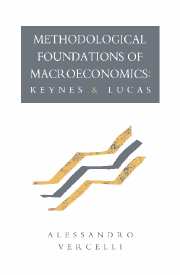Book contents
- Frontmatter
- Contents
- Preface
- List of abbreviations
- 1 Introduction
- Part 1 Methodological foundations of macroeconomics
- Part II Keynes after Lucas
- 8 Lucas's scientific paradigm
- 9 Lucas's heuristic model
- 10 The real equilibrium business cycle and Lucas's attempt at a synthesis
- 11 Keynes's heuristic model: general observations
- 12 Money and production in Schumpeter and Keynes: two dichotomies
- 13 Keynes's heuristic model: methodological aspects
- 14 Conclusions
- References
- Subject index
- Author index
13 - Keynes's heuristic model: methodological aspects
Published online by Cambridge University Press: 05 January 2012
- Frontmatter
- Contents
- Preface
- List of abbreviations
- 1 Introduction
- Part 1 Methodological foundations of macroeconomics
- Part II Keynes after Lucas
- 8 Lucas's scientific paradigm
- 9 Lucas's heuristic model
- 10 The real equilibrium business cycle and Lucas's attempt at a synthesis
- 11 Keynes's heuristic model: general observations
- 12 Money and production in Schumpeter and Keynes: two dichotomies
- 13 Keynes's heuristic model: methodological aspects
- 14 Conclusions
- References
- Subject index
- Author index
Summary
We do not know what the future will bring, except that it will be quite different from anything we could predict.
(Keynes, CW, vol. 27, p. 62)Introduction
Keynes's fundamental contribution in the General Theory is the exposition and application of the heuristic model of a monetary economy whose results differ from those of the classical model, both at the level of factual interpretation and at the level of economic policy. The brief digressions of a strictly analytical nature are quite unsatisfactory. Other digressions, meant to give a more precise idea of the ‘vision’ underlying the General Theory, are doubtless of considerable interest. But Keynes's ‘vision’ of capitalist dynamics is in many ways irremediably dated, not to say idiosyncratic. The fairy-tale of overcoming the scarcity of capital in one or two generations, the naive notion of ‘socialization of investment’, the simplistic analysis of tendencies to stagnation under capitalism, are a few examples of the limitations of his ‘vision’ of the capitalist system.
If the General Theory offered only an articulated ‘vision’ of the capitalist system, accompanied by a few analytical insights, it would be rightly considered as a historically important but hopelessly dated work which can no longer serve as a direct source of inspiration. But between Schumpeter's two poles – vision of the economic system and economic analysis – there is an intermediate level which in the General Theory plays a decisive role: the construction and utilization of a general heuristic model that suggests a ‘method’ for dealing with economic problems.
Information
- Type
- Chapter
- Information
- Methodological Foundations of MacroeconomicsKeynes and Lucas, pp. 219 - 233Publisher: Cambridge University PressPrint publication year: 1991
